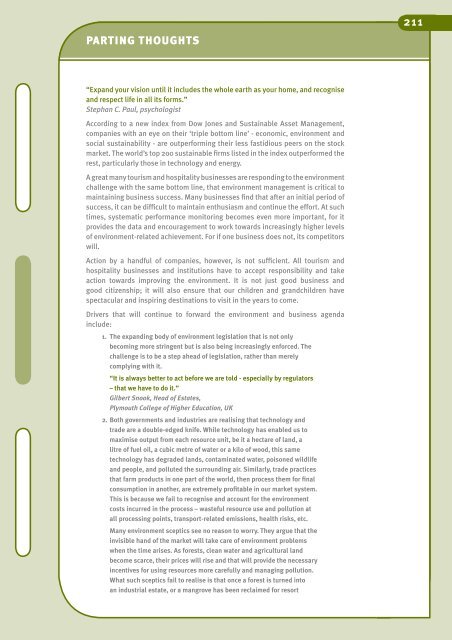Online version: PDF - DTIE
Online version: PDF - DTIE
Online version: PDF - DTIE
You also want an ePaper? Increase the reach of your titles
YUMPU automatically turns print PDFs into web optimized ePapers that Google loves.
PARTING THOUGHTS<br />
211<br />
“Expand your vision until it includes the whole earth as your home, and recognise<br />
and respect life in all its forms.”<br />
Stephan C. Paul, psychologist<br />
According to a new index from Dow Jones and Sustainable Asset Management,<br />
companies with an eye on their ‘triple bottom line’ - economic, environment and<br />
social sustainability - are outperforming their less fastidious peers on the stock<br />
market. The world’s top 200 sustainable firms listed in the index outperformed the<br />
rest, particularly those in technology and energy.<br />
A great many tourism and hospitality businesses are responding to the environment<br />
challenge with the same bottom line, that environment management is critical to<br />
maintaining business success. Many businesses find that after an initial period of<br />
success, it can be difficult to maintain enthusiasm and continue the effort. At such<br />
times, systematic performance monitoring becomes even more important, for it<br />
provides the data and encouragement to work towards increasingly higher levels<br />
of environment-related achievement. For if one business does not, its competitors<br />
will.<br />
Action by a handful of companies, however, is not sufficient. All tourism and<br />
hospitality businesses and institutions have to accept responsibility and take<br />
action towards improving the environment. It is not just good business and<br />
good citizenship; it will also ensure that our children and grandchildren have<br />
spectacular and inspiring destinations to visit in the years to come.<br />
Drivers that will continue to forward the environment and business agenda<br />
include:<br />
1. The expanding body of environment legislation that is not only<br />
becoming more stringent but is also being increasingly enforced. The<br />
challenge is to be a step ahead of legislation, rather than merely<br />
complying with it.<br />
“It is always better to act before we are told - especially by regulators<br />
– that we have to do it.”<br />
Gilbert Snook, Head of Estates,<br />
Plymouth College of Higher Education, UK<br />
2. Both governments and industries are realising that technology and<br />
trade are a double-edged knife. While technology has enabled us to<br />
maximise output from each resource unit, be it a hectare of land, a<br />
litre of fuel oil, a cubic metre of water or a kilo of wood, this same<br />
technology has degraded lands, contaminated water, poisoned wildlife<br />
and people, and polluted the surrounding air. Similarly, trade practices<br />
that farm products in one part of the world, then process them for final<br />
consumption in another, are extremely profitable in our market system.<br />
This is because we fail to recognise and account for the environment<br />
costs incurred in the process – wasteful resource use and pollution at<br />
all processing points, transport-related emissions, health risks, etc.<br />
Many environment sceptics see no reason to worry. They argue that the<br />
invisible hand of the market will take care of environment problems<br />
when the time arises. As forests, clean water and agricultural land<br />
become scarce, their prices will rise and that will provide the necessary<br />
incentives for using resources more carefully and managing pollution.<br />
What such sceptics fail to realise is that once a forest is turned into<br />
an industrial estate, or a mangrove has been reclaimed for resort
















